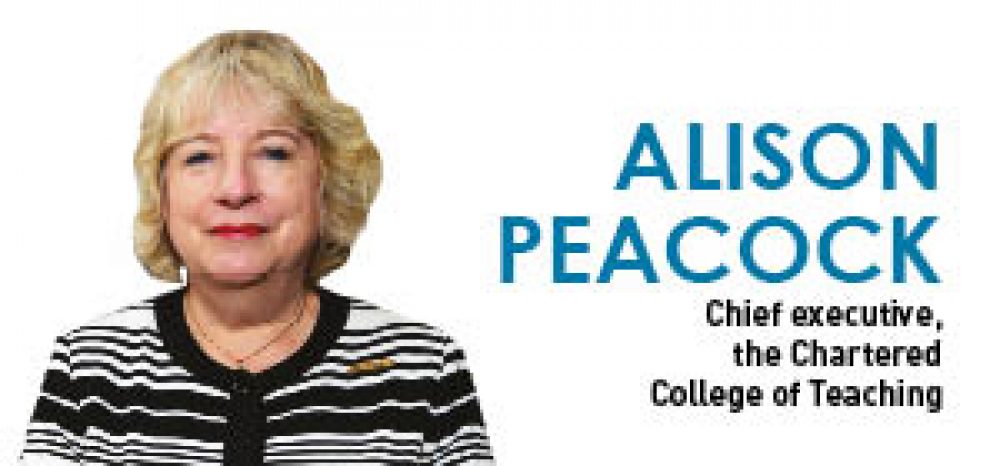With a more solid understanding of research, we will be better prepared to challenge poorly-evidenced policy proposals, says Alison Peacock
Last week, I was invited to join a police chief constable and presidents of a range of royal medical colleges to sign an evidence declaration. This declaration commits us to promoting evidence-informed pedagogy and leadership.
Using the best available evidence to inform decision-making at every level seems an obvious idea. For too long, however, access to useful research has been limited for teachers. Pseudoscience or research of dubious validity is too often popularised and erroneously cited as justification for unhelpful classroom practices.
The Chartered College of Teaching is committed to supporting teachers to engage with research, and build their research literacy. Members have access to an extensive research database, receive our termly journal and participate in regional networks.
Teachers are best placed to identify strategies that will work in their particular context, and it is their professional judgement that decides whether and how to trial new approaches in the classroom. This allows them to reclaim their professional judgement. Being informed by the best available evidence – and having the skills to interrogate and interpret it – enables teachers to articulate what they are doing and why.
In this way, professionals can identify and resist certain practices that have limited, if any, effect on student learning. I have seen many great examples recently of headteachers who have reduced teacher workload by overhauling their schools’ assessment policies by recognising that many time-consuming marking habits are ineffective.
We have the confidence to respond in a manner that places professional judgement informed by evidence above mere compliance
It also means that when powerful organisations, such as the Department for Education, Ofsted and others, assert that teachers and schools should be held to account for certain policies, we have the confidence to respond in a manner that places professional judgement informed by evidence above mere compliance.
Too often, funding has followed policy hunch, and while I recognise that there may be other influences on both school and national decision-making, evidence should not be ignored.
In some cases, evidence does not yet provide the answers. In these situations it is better to value questions, and embrace the fact that we do not know what works, rather than retrofit evidence to policy. In other cases, research outcomes are mixed, and there is a risk of confirmation bias, which must be accounted for.
Perhaps most worryingly, however, is where evidence appears to be either ignored entirely or used selectively to justify policy decisions. The government’s attempt to expand grammar schools is one example, though the fact that it was firmly rebutted should be celebrated. Ofsted’s removal of graded lesson observations is another such success.
At a time of fake news and proliferating assertions that deny evidence, it is increasingly important that wider society understands the importance of challenging rhetoric and understanding facts.
Teachers are ideally placed to educate young people – and thereby wider society – about the importance of demanding and interrogating evidence. Skills of statistical analysis, synthesis of data and the capacity to challenge prevailing views are all too rare, even among academics and learned professionals.
We often hear that those of us in education have a great deal to learn from doctors, and we should emulate the authority and respect they command. Interestingly, when signing the evidence declaration, the discussion focused on the vital contribution needed from the education sector. Teachers are in a unique position to teach young people how to interrogate assertions as fact. We cannot expect teachers to do this, however, unless they are equipped to interpret research findings, and unless we learn to engage with evidence at all levels in the education system.
The biggest challenge of all is building research literacy. We do not know enough yet about how to move robust ideas around the system. We need to nudge, keep it simple, adapt and review. The CCT is here to help make research accessible to busy teachers who in turn will gain agency and respect through clearly articulating not only what they are teaching but why. When policymakers can do the same we shall know that we have made progress.
Alison Peacock is chief executive of the Chartered College of Teaching







“Teachers are in a unique position to teach young people how to interrogate assertions as fact. We cannot expect teachers to do this, however, unless they are equipped to interpret research findings, and unless we learn to engage with evidence at all levels in the education system.”
All well and good, but the interpretation-equipping and evidence-engagement must be much more than having some resources available through membership of the College and gurus followed on social media.
To equip and to engage teachers meaningfully they require educating in research. So, in particular, education research methods and philosophies should be central to initial teacher education programmes. This means teacher training schemes of a mere 5 or so weeks, such as the one Dame Peacock represents, or schemes based predominantly in schools, for example, just won’t do.
I think this is an encouraging piece. I applaud Alison for articulating a future in which teachers and school leaders have the wherewithal to ascertain what works well for them and use evidence to support their convictions even when their beliefs and practices rub against the grain of guidelines and principles of ‘powerful organisations’ in education. Evidence though comes in many forms and the veracity of findings from public research quite rightly needs to be considered. Good quality educational research can be good at drawing our attention to what worked however it is much less able to inform us about what works. Effectiveness in education is both temporal and contextual. It is wise therefore to remember the mantra ‘anything is likely to work somewhere at some time but nothing is likely to work everywhere all of the time’.